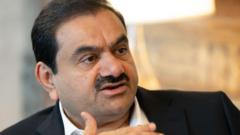Nate Anderson, founder of Hindenburg Research, announced the closure of the firm following its significant exposés including an explosive report on India's Adani Group, which rocked the stock market and spurred political debates.
Hindenburg Research to Disband After Controversial Accusations Against Adani Group

Hindenburg Research to Disband After Controversial Accusations Against Adani Group
Short-selling firm Hindenburg Research is closing shop nearly eight years after igniting major financial controversies in India and beyond.
In a significant turn of events, US-based Hindenburg Research, renowned for its controversial accusations against financial giants, will be disbanding. Founder Nate Anderson made the announcement on Wednesday, citing a desire to spend more time with family and friends. Established in 2017, the firm gained notoriety for revealing alleged financial misconduct in various high-profile companies, prompting regulators to take action against numerous entities.
One of Hindenburg's most impactful reports was published in early 2023, alleging that Gautam Adani's conglomerate engaged in extensive stock manipulation and accounting fraud. This led to a staggering $108 billion reduction in Adani Group's market valuation, although the group later experienced a financial recovery. In response to the allegations, Adani denied wrongdoing, calling the claims an affront to India, further fueling political discourse in the country.
Throughout its history, Hindenburg Research instigated legal scrutiny of nearly 100 individuals, including billionaires, by shining a spotlight on questionable business practices. Notably, the company attracted attention in 2020 after accusing electric vehicle manufacturer Nikola Corp. of misleading investors, contributing to significant fallout for its founder.
Aside from the accusations against high-profile companies, Hindenburg also raised concerns about Madhabi Puri Buch, the head of India's Securities and Exchange Board, alleging connections to offshore funds linked to the Adani Group. Both Buch and the Adani Group have rejected these claims.
Anderson's decision to shutter the firm marks a significant moment in the realm of financial journalism and short-selling. He expressed intentions to make Hindenburg's research methodologies publicly available, stating, “Over the next six months or so, I plan to work on a series of materials and videos to open-source every aspect of our model and how we conduct our investigations.” Short-sellers like Hindenburg profit by betting against companies they suspect of fraud, a practice that they argue serves the greater interest of transparency in the financial markets.
One of Hindenburg's most impactful reports was published in early 2023, alleging that Gautam Adani's conglomerate engaged in extensive stock manipulation and accounting fraud. This led to a staggering $108 billion reduction in Adani Group's market valuation, although the group later experienced a financial recovery. In response to the allegations, Adani denied wrongdoing, calling the claims an affront to India, further fueling political discourse in the country.
Throughout its history, Hindenburg Research instigated legal scrutiny of nearly 100 individuals, including billionaires, by shining a spotlight on questionable business practices. Notably, the company attracted attention in 2020 after accusing electric vehicle manufacturer Nikola Corp. of misleading investors, contributing to significant fallout for its founder.
Aside from the accusations against high-profile companies, Hindenburg also raised concerns about Madhabi Puri Buch, the head of India's Securities and Exchange Board, alleging connections to offshore funds linked to the Adani Group. Both Buch and the Adani Group have rejected these claims.
Anderson's decision to shutter the firm marks a significant moment in the realm of financial journalism and short-selling. He expressed intentions to make Hindenburg's research methodologies publicly available, stating, “Over the next six months or so, I plan to work on a series of materials and videos to open-source every aspect of our model and how we conduct our investigations.” Short-sellers like Hindenburg profit by betting against companies they suspect of fraud, a practice that they argue serves the greater interest of transparency in the financial markets.




















